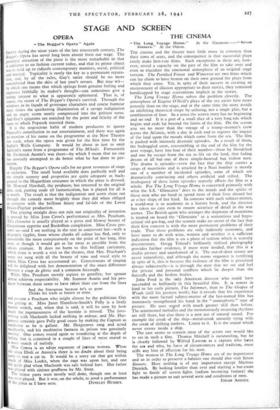STAGE AND SCREEN
OPERA
" The Beggar's Opera " Again
EXCEPT during the nicer years of the late nineteenth century, The Beggar's Opera has never long been absent from our stage. The perennial attraction of the piece is the more remarkable in that it conforms to no fashion current today, and that its prime object was to hold up to ridicule contemporary manners, social, political and musical. Topicality is rarely the key to a permanent reputa- tion, and, by all the rules, Gay's satire should be no more remembered than the skits of last year's revues. But true wit— by which one means that which springs from genuine feeling and expresses faithfully its maker's thought—can sometimes give a lasting interest to what is apparently ephemeral. That is, of course, the secret of The Beggar's Opera's survival. Through the windows in its facade of grotesque characters and coarse humour there shines the quickening illumination of a savage indignation and an angry scorn neatly compressed into the pithiest verse. And Gay's epigrams are matched by the point and felicity of the tunes to which Pepusch married them.
It is the ungracious habit of modern producers to ignore Pepusch's contribution to our entertainment, and there was again no mention of his name on the programme at the New Theatre last week, when the opera was given for the first time by the Sadler's Wells Company. It would be about as just to omit Sullivan's name from a programme of The Mikado. Fortunately Mr. Frederick Austin's was there—by which I mean that no one has unwisely attempted to do better what he has done to per- fection.
Happily The Beggar's Opera calls for no great resources of stage or orchestra. The small band available does perfectly well and the simple scenery and properties are quite adequate as back- ground to the Hogarthian costumes in which the piece is dressed. Mr. Howard Marshall, the producer, has returned to the original date, and, putting aside all fantastication, has it played for all it
- is worth. The result is that the indignation and scorn shine out through the comedy more brightly than they did when obliged to compete with the brilliant finery and fal-lals of the Lovat - Fraser-Playfair production.
That playing straight does not rule out originality of invention is proved by Miss Joan Cross's performance as Mrs. Peachum. This character is usually played as a gross and blowsy boozer of Gargantuan appetite and Bardolfian complexion. Miss Cross pre- sents us—and I see nothing in the text to controvert her—with a dyspeptic tippler, from whose cheeks all colour has fled, only to reassemble the more conspicuously on the point of her long, thin nose, as though it would get as far away as possible from the odious creature. It does no harm to this brilliant caricature, which alone is worth a visit to the theatre, that Mrs. Peachum's songs are sung with all the beauty of tone and vocal style to which Miss Cross has accustomed us. Connoisseurs of singing will be delighted with her demonstration of the exact difference between a coup de glotte and a common hiccough.
While Mrs. Peachum merely aspires to gentility, her spouse almost achieves respectability. Mr. Sumner Austin and his pro- ducer between them seem to have taken their cue from the lines And the Statesman because he's so great Thinks his trade as honest as mine.
and present a Peachum who might almost be the politician Gay was getting at. Miss Janet Hamilton-Smith's Polly is a lively buxom wench, and, when that is said, it will be seen by how much the ingenuousness of the heroine is missed. The love- making with Macheath lacked nothing in ardour, and Mr. Har- greaves certainly gave Polly good cause by making the Captain as handsome as he is gallant. Mr. Hargreaves sang and acted excellently, and his meditative fantasia in prison was genuinely moving. One comes round again to wondering at the depth of feeling that is contained in a couple of lines of verse mated to a mere snatch of melody. Miss Coates is an adept exponent of jealous women. When the sings Eboli or Amneris there is no doubt about their being Nils to tear a cat in. It would be a sorry cat that got within reach of Miss Loden, when the rage was upon her, and one felt quite glad when Macheath was safe behind bars. Her father was played with sinister gruffness by Mr.,Stear. The minor parts were mostly well done, though one at least was over-played. But it was, on the whole, as good a performance of the piece as I have seen. DYNELEY HUSSEY.


























 Previous page
Previous page